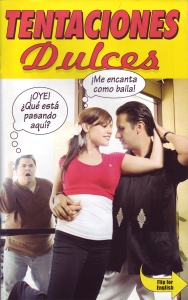One of the real treats at last year’s Comics & Medicine conference in Baltimore was a presentation by Melvin F. Baron, Associate Professor of Clinical Pharmacy at the University of Southern California School of Pharmacy. He gave a fantastic talk on the use of fotonovelas in raising awareness of diabetes and disseminating information about diabetes-prevention among Latino communities in East Los Angeles.
The fotonovela is a photo-comic, popular in Latino communities since the mid-twentieth century, often vehicles for dramatic, romantic stories. Recently, they have been adopted as a medium for health information, and Melvin talked more about how effective they were as a communication tool (more on that evaluation here and here). He had a stack of them to give away, and I was lucky enough to grab three of them – and they’re great! They’re pocket-sized, published in both English and Spanish in the same volume, and have a 24-page photo-story followed by a three-page Q&A-based “additional information” bit with the main characters from the fotonovela story.
What I found particularly interesting in Melvin’s project (and in other uses of fotonovelas among Latino communities), was the decision to not just use, but exploit a specific comic format and style familiar to, and accepted by, a specific audience. Sweet Temptations is not just a diabetes information booklet in the form of a fotonovela, it is a fotonovela about diabetes: the distinction here is more than just semantics. You could pick up Sweet Temptations and read it as just another fotonovela – the characters, situations, style of production, look and feel of the booklet all make it feel like a “real” fotonovela. But it’s more than just a clever pastiche. The larger-than-life characters, the fast-pacing of the story, the dramatic script, the hammy acting – all these inextricable characteristics of the fotonovela are intentionally used to further the health-based narrative, enliven the informational content and push the message home.
Too often informational comics simply use a “standard” comics approach rather than explore the medium more closely. This can result in a comic which looks like a comic, but doesn’t go much further. What I’m starting to learn is that understanding and exploiting a target audience’s specific expectations of comics can deliver works that are more than simply attractive or appealing, but truly effective.
Don’t forget: Applied Comics Network meet-up day – May 9th, 12-4pm, London College of Communication : more via ACN on Twitter



